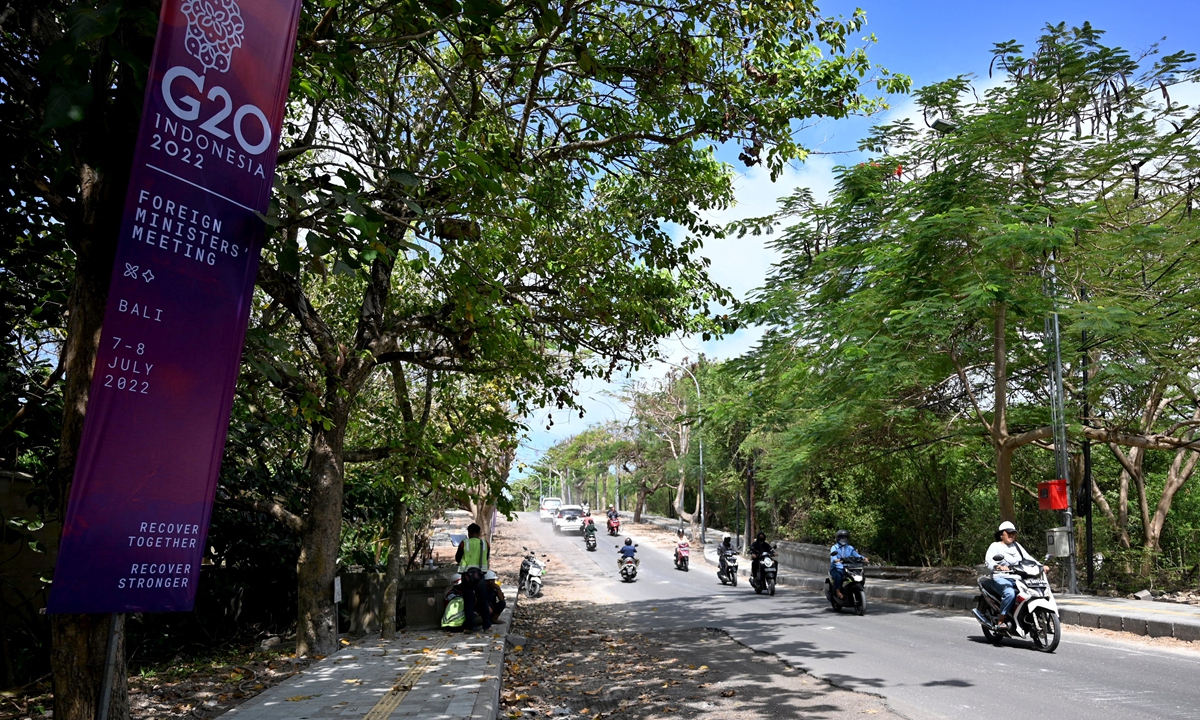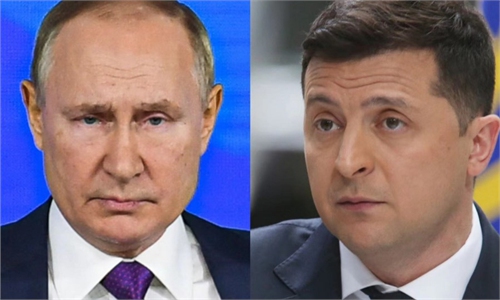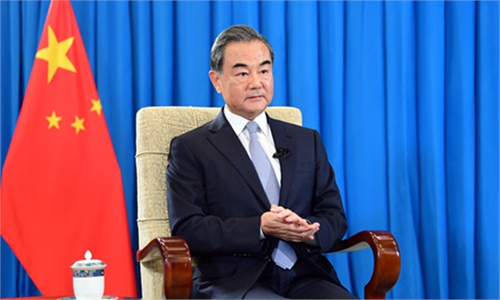
Motorcyclists ride past a banner for the G20 Foreign Ministerial Meeting scheduled to be held on July 7-8, outside the meeting venue in Bali, Indonesia on July 5, 2022. Guided by the theme "Recover Together, Recover Stronger," the meeting aims to enhance further collaboration to revive multilateralism in addressing global challenges. Photo: AFP
While the Ukraine crisis is anticipated to top the agenda during the upcoming G20 (Group of 20) foreign ministers' meeting to be held from Thursday to Friday, the US plans to pressure many of the world's largest economies to take a tougher stance toward Russia and China while these largest economies are supposed to discuss economic issues.
Chinese observers have stated that the G20 is not an exclusive club which belongs to the West, and it would be " daydreaming" for the US to seek to turn this occasion into an anti-Russia and anti-China platform — unlike the G7, the G20 represents emerging powers that seek solutions to challenges such as economic turbulence and food crisis rather than divide the world by creating more geopolitical conflicts.
Foreign ministers from the G20, including Western countries that strongly oppose Russia's military operations in Ukraine as well as emerging economies such as India and Indonesia which have been restrained in condemning Russia, are scheduled to meet Thursday. It will be the first time that foreign ministers from these countries have met Russian Foreign Minister Sergey Lavrov since Russia's military operations started in February, Reuters reported on Wednesday.
US Secretary of State Antony Blinken will call on the G20 countries to increase pressure on Russia, calling for the efforts in reopening "sea lanes blocked by the Ukraine conflict" and repeating warnings to China to not support Russia during the crisis, according to the Reuters report.
Some US allies, including Germany and Japan, echoed these intentions. German foreign ministry spokesperson Christian Wagner was quoted as saying that the upcoming meeting would not be a "normal summit" or "business as usual." Germany will coordinate in Bali over how to respond to Lavrov in light of the Ukraine crisis, said Wagner, Reuters reported.
Japanese Foreign Minister Hayashi Yoshimasa said ahead of the meeting that Japan will work with relevant countries to earnestly uphold Japan's position on Russia's operations in Ukraine, which has "shaken the foundation of the international order," Kyodo News said on Tuesday.
When asked about whether Yoshimasa would walk out if Russian representative delivers a speech at the meeting, as officials from Britain, Canada and the US previously did so during a G20 finance ministers' meeting in Washington in April, Yoshimasa said he would "respond properly" when Lavrov speaks, according to Japanese media.
But Chinese experts predicted it is impossible to form a unified anti-Russia or anti-China alliance at the G20, as many countries do not share a similar stance to the US-led Western bloc, and they expect the Ukraine crisis could be solved through diplomatic consultation rather than exerting pressure which creates more conflicts.
'Not a club of the West'
The US intends to make the G20 another chance to diplomatically target Russia and it will not forfeit any chance to do so at such multilateral gatherings, be it political or economic. US foreign policy is characterized by putting American interests above all, Yang Xiyu, a senior research fellow at the China Institute of International Studies, told the Global Times on Wednesday.
"But the G20 is neither an exclusive club of the West nor a platform possessed by the US. A majority of countries across the world did not join the West-led sanctions against Russia, and the G20 is composed of many developing countries that don't dance to the US' tune," Yang said.
Nearly one-third of the world's population live in a country that has remained neutral on the Russia-Ukraine conflict, represented by India. These non-aligned states also include Brazil, Saudi Arabia, South Africa and the UAE, which will do their utmost to avoid taking sides while seeking to benefit from their neutrality, according to an analysis of Economist Intelligence Unit.
Indonesian President Joko Widodo met with Russian President Vladimir Putin in Moscow on June 30, and some media reports suggest Indonesia's reluctance to exclude Putin from the G20 summit in November showed that it does not want to be seen as taking sides and it hopes to concentrate on this year's meeting which will focus on a global post-COVID economic recovery.
Lü Xiang, a research fellow from the Chinese Academy of Social Sciences, told the Global Times on Wednesday it is not so much the Russia-Ukraine conflict that has caused the worldwide economic crisis, but rather it is the numerous sanctions jointly imposed by the US-led West that have caused chaos across the global supply chain and aggravated an emerging global economic crisis.
If the US uses the G20 as a venue to attack Russia, it will only complicate the situation and do no help resolve its domestic issues, the expert said. "Western countries' economic predicament and other domestic problems cannot be solved by expanding or intensifying the geopolitical tension," he noted.
Chinese experts have suggested it may be difficult to achieve any consensus at the upcoming G20 foreign ministers' meeting and they warned that an anti-Russia alliance would not play out as the West desired. "Russia is one of the few countries that can build a fortress economy through balancing internal demand and supply, and Western intentions to bring Russia down by the use of economic sanctions will only hurt themselves," Lü said.
Urgent economic issues
Launched in 1999 as a meeting of finance ministers and central bank governors, the G20 evolved into a yearly summit involving the heads of state and government alongside other meetings throughout the year. It's a strategic multilateral platform connecting the world's major developed and emerging economies, holding a strategic role in securing future global economic growth and prosperity, as its website showed.
"As one of the most important and legitimate platforms for the global economic governance, the G20 also coordinates with other multilateral platforms like the BRICS, making future global governance fairer and more sustainable," Wang Yiwei, director of the Institute of International Affairs at Renmin University of China, told the Global Times on Wednesday.
Against the backdrop of US-led containment of China and Russia, the two countries are coordinating closely.
During a meeting between Vice Foreign Minister Ma Zhaoxu and Russian Ambassador to China Andrey Ivanovich Denisov on Tuesday, Ma said under the guidance of top leaders of the two countries, China-Russia relations continue to grow. China is ready to strengthen strategic coordination with Russia, expand practical cooperation across the board, and deepen cooperation within multilateral frameworks such as the UN, the Shanghai Cooperation Organization, BRICS and the G20, and steer the global governance system toward greater impartiality and equity.
Food and energy security will figure prominently at the G20 foreign ministers' meeting, and a senior US official claimed Russia should be held accountable for these issues. The US official also said there will be a "candid" exchange on Ukraine when Blinken meets China's State Councilor and Foreign Minister Wang Yi on the G20 sidelines, according to media reports.
Yang Xiyu from China Institute of International Studies said, "If the US really wants to solve the food issue, it should first look into how to deal with the problem itself rather than how to contain Russia," as only when officials stop blaming each other can there be opportunity for a joint action in facing up to the crisis.



